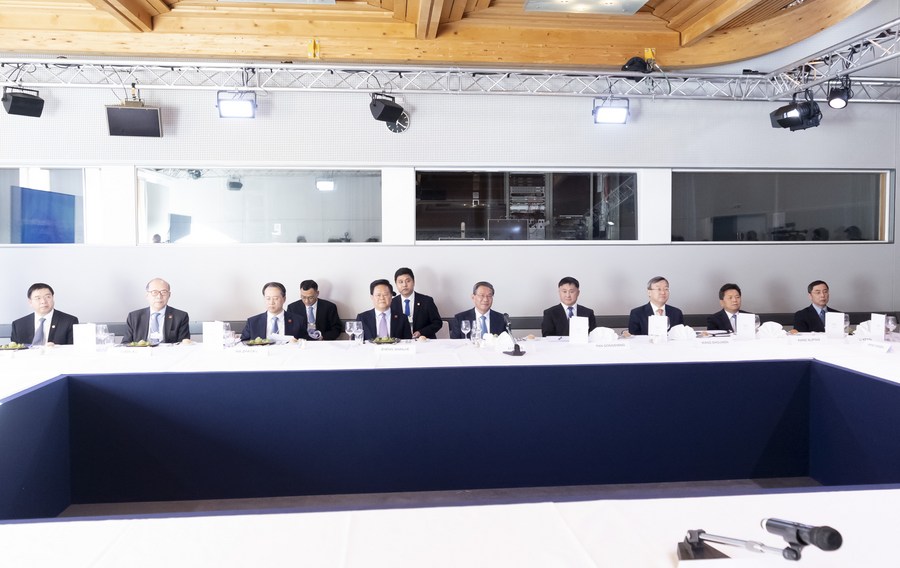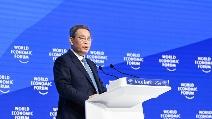
Chinese Premier Li Qiang attends the World Economic Forum (WEF) Annual Meeting 2024 and delivers a special address to the event in Davos, Switzerland, Jan. 16, 2024. (Xinhua/Rao Aimin)
In addition to China's proposals on addressing world challenges, the Chinese premier's insights on the Chinese economy were another crucial focus for the political and business elites in attendance.
DAVOS, Switzerland, Jan. 17 (Xinhua) -- In a spotlight event held on Tuesday at the World Economic Forum (WEF) Annual Meeting 2024 in Davos, Chinese Premier Li Qiang took the stage as the first speaker to deliver a special address.
Inviting Li to commence his speech, Klaus Schwab, founder and executive chairman of the WEF, said: "We are all eager to hear your insights on the current challenges and opportunities facing China and the world, especially against the backdrop of this meeting's theme, 'Rebuilding Trust.'"
Li began his address by elucidating his perspective on "Rebuilding Trust."
"The lack of trust is aggravating risks to global growth and peaceful development," Li said, emphasizing that "whether it is to overcome current difficulties, or to create a better future, it is essential that we discard prejudice, bridge differences and work as one to tackle the trust deficit."
This year's WEF gathering takes place against the backdrop of unprecedented global economic challenges with more than half of chief economists expecting a weakening global economy in 2024, and seven in ten predicting an acceleration in the pace of geoeconomic fragmentation, according to the latest Chief Economists Outlook released by WEF. That's why many like Schwab were waiting for answers from China.
In his speech, Li cautioned against "fragmented and separate responses" to global crises, suggesting countries strengthen macroeconomic policy coordination and firmly uphold the multilateral trading system to build greater synergy for global growth.
He also underscored the importance of keeping global industrial and supply chains "stable and smooth" by strengthening global industrial specialization and collaboration and firmly advancing trade and investment liberalization and facilitation.
The Chinese premier called for cooperation in innovation to keep competition healthy and at the same time urged strengthening cooperation on green development to actively tackle climate change.
Noting that problems like the North-South gap, divergences in recovery, and the technological divide have become more acute, Li said it is imperative to enhance North-South and South-South cooperation, so as to build a universally beneficial and inclusive world economy.
In addition to China's proposals on addressing world challenges, the Chinese premier's insights on the Chinese economy were another crucial focus for the political and business elites in attendance.
Li's speech met their expectations. The Chinese premier shared with the audience the proper method to observe the Chinese economy. He underscored that understanding the Chinese economy requires broadening one's vision and adopting a panoramic view to grasp the whole picture, akin to appreciating the beauty of the Alps by zooming out and looking from afar.
Using data, arguments, and commitments, he drove home the point that "choosing the Chinese market is not a risk but an opportunity."
Regarding the operational dynamics of the Chinese economy, he presented these statistics: in 2023, the Chinese economic trajectory experienced a resurgence, ascending with an approximate GDP growth of 5.2 percent, surpassing the initial target of around 5 percent set at the commencement of the year. Presently, China boasts an impressive array of approximately 400,000 high-tech enterprises, the second-highest globally in terms of the number of unicorn companies.
In demonstrating the allure of China for foreign investments and enterprises, he provided the following data: in China, there are now over 400 million people in the middle-income bracket, and the number is expected to reach 800 million in the next decade or so.
China's overall tariff level has been cut to 7.3 percent, close to that of developed members of the World Trade Organization. In the past five years, the return on foreign direct investment in China stood at around 9 percent, which is quite competitive globally.
China will stay committed to the fundamental national policy of opening up and open its door even wider to the world, Li said, adding that his country embraces investments from businesses of all countries with open arms, and will steadily expand institutional opening up, continue to shorten the negative list for foreign investment, provide national treatment for foreign businesses, and keep fostering a market-oriented, law-based and world-class business environment.
After Li's address, Schwab thanked the Chinese premier for sharing proposals related to strengthening global cooperation, and providing "a trustful outlook for China's economy."
"The premier's address conveyed unwavering determination to promote the construction of an open world economy and once again expressed confidence in sharing China's development opportunities with countries worldwide," Deloitte China Chair Jiang Ying told Xinhua.
China contributes "a diverse and stable industrial supply system and an extensive consumer market" to the global economy, Jiang said, adding that Chinese innovation has also been continuously injecting new vitality into global industrial prosperity.

Chinese Premier Li Qiang attends a luncheon hosted by Klaus Schwab, founder and executive chairman of the World Economic Forum (WEF), and exchanges views with heads of multinational companies during the WEF Annual Meeting 2024 in Davos, Switzerland, Jan. 16, 2024. (Xinhua/Ding Haitao)
Li later in the day met leaders of 14 multinational companies, including Walmart, JPMorgan Chase, Intel, BASF, Volkswagen, and Siemens, during a lunch.
Over the years, their investments in the Chinese market have achieved tremendous success, and they are fully confident in China's economic development and are willing to deepen cooperation with China, persist in developing in China, and contribute to China's development, the business and finance leaders told Li.




 A single purchase
A single purchase









